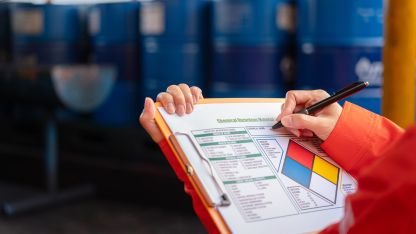Intertek provides compliance solutions for the Waste Framework Directive by helping companies fulfill their SCIP Database requirements.
Starting January 2021, the SCIP Database ["Substances of Concern In articles, as such or in complex objects (Products)"] will force manufacturers and suppliers of products containing SVHCs to submit information concerning their presence.
The SCIP database will enable a uniform collection of information. The legal basis for this database is the EU Waste Framework Directive (WFD). The information required concerns the safe use of products and "complex objects" (products) with a certain proportion of SVHC.
The information requirements that define the content of the database have been developed based on legal requirements and consultation with the European Commission, Member States and stakeholders.
Item suppliers must provide:
- Information that can be used to identify the item;
- Name, concentration range and location of the SVHC in the article; and
- May require additional information on the safe use of the item.
The SCIP database provides waste operators with information on the hazardous substances in the waste they process so that material flows can potentially be “cleaned” prior to recycling and reused in the manufacture of new items to ensure a true and safe circular economy. In addition, increased transparency regarding the presence of hazardous substances will help consumers make more informed decisions when buying products and provide information on the best possible use and disposal of such items.
Who is Affected?
- EU producers and assemblers
- EU importers
- EU distributors of articles and other actors in the supply chain placing articles on the market
If you are a retailer or another actor in the supply chain that supplies these articles directly to the consumer, you are not obligated to submit information. Any duty holders, however, may provide further information on a voluntary basis.
The Intertek Advantage
Intertek can utilize its network of laboratories, auditors and regulatory experts to help assess the risks based on your products and materials and to help mitigate risk of having SVHCs in your product. Furthermore, Intertek works with you to understand whether you need to provide communication set forth by the EU REACH Regulation and the Waste Framework Directive. Our Intertek experts will advise you on the compliance process and how to prepare your notification dossier and submit it.
Our Services Include:
Intertek specializes in assessing and converting Bill of Materials (BoM) into a regulatory compliant state. We perform the required data gathering, assessment, electronic design, and provide replacement options where possible to meet the legal requirements and goals of our customers.
Intertek’s BoM Services are customizable for a wide range of global, regional and local health and environmental legislations and requirements including RoHS, REACH SVHC, California Proposition 65, and many other developing legislations and requirements.
With global regulatory requirements shifting towards risk-based compliance, Intertek’s Material Risk Assessment solutions provide our customers with outputs which can provide clarity and direction to mitigate risk when complying with global regulated substances such as Global RoHS, EU REACH and California Proposition 65 requirements.
Intertek’s risk assignment methodology applies the risk status of a restricted or declarable substance to a specific material or component used in customer products. This risk is adjusted based on available information, including, declaration of compliance, material declarations, test reports, litigation, etc. With the guidance of Intertek's regulatory experts, our customers will have a better understanding of their true inherent risks for their product and/or business. This allows them to take the necessary steps to reduce those risks and achieve product compliance.
Utilizing Intertek’s state-of-the-art analytical laboratories worldwide, we can provide SVHC screening for a broad range of products including automotive, aerospace, electronics, consumer, building, cosmetics, and general preparations. Intertek’s global laboratories use modern analytical and quantification techniques on soluble and insoluble materials to create a comprehensive fingerprint of each product for use in the SVHC declaration.
If products contain any SVHCs, Intertek can provide regulatory support to identify which material or component the SVHC is present in, create a replacement strategy, or prepare REACH disclosure documentation to assure your business is not interrupted.
Our vast knowledge of working with the ECHA IUCLID tool allows us to support our customers with extracting the necessary data and creating the submission file to the ECHA SCIP Database. Regardless of our client's chosen submission method, we can provide effective support.

Chemical News
Webinars:
Blogs:
White Papers:
- Safety Data Sheets: Evaluation, Creation, Compliance, and Future Trends
- Ensuring Compliance with Safety Data Sheets
- Microorganism and Biotechnology Regulation In Canada and The United States
- The EU Biocides Product Regulation
- PFAS Regulations in the United States
Brochures:

Restricted Substances News
Webinars:
Blogs:
White Papers:
Brochures:
